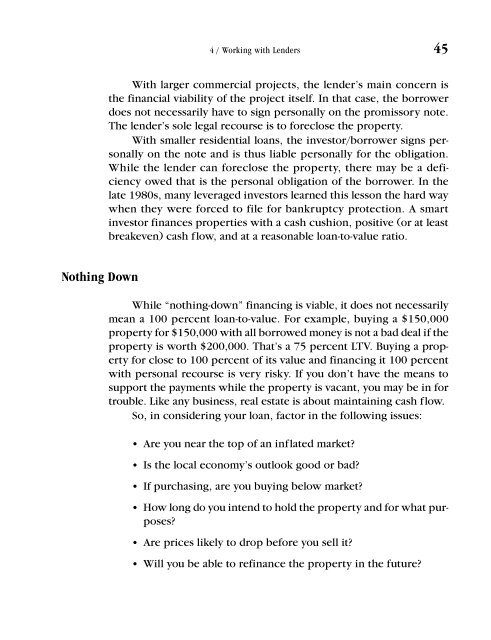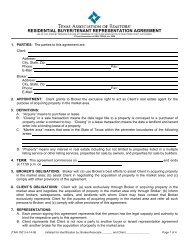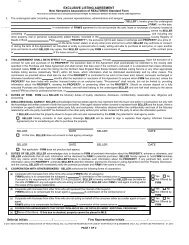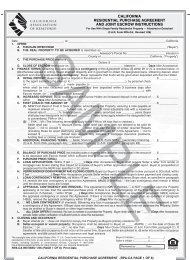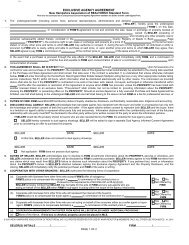financing secrets of a millionaire real estate investor.pdf
financing secrets of a millionaire real estate investor.pdf
financing secrets of a millionaire real estate investor.pdf
Create successful ePaper yourself
Turn your PDF publications into a flip-book with our unique Google optimized e-Paper software.
4/Working with Lenders 45<br />
With larger commercial projects, the lender’s main concern is<br />
the financial viability <strong>of</strong> the project itself. In that case, the borrower<br />
does not necessarily have to sign personally on the promissory note.<br />
The lender’s sole legal recourse is to foreclose the property.<br />
With smaller residential loans, the <strong>investor</strong>/borrower signs personally<br />
on the note and is thus liable personally for the obligation.<br />
While the lender can foreclose the property, there may be a deficiency<br />
owed that is the personal obligation <strong>of</strong> the borrower. In the<br />
late 1980s, many leveraged <strong>investor</strong>s learned this lesson the hard way<br />
when they were forced to file for bankruptcy protection. A smart<br />
<strong>investor</strong> finances properties with a cash cushion, positive (or at least<br />
breakeven) cash flow, and at a reasonable loan-to-value ratio.<br />
Nothing Down<br />
While “nothing-down” <strong>financing</strong> is viable, it does not necessarily<br />
mean a 100 percent loan-to-value. For example, buying a $150,000<br />
property for $150,000 with all borrowed money is not a bad deal if the<br />
property is worth $200,000. That’s a 75 percent LTV. Buying a property<br />
for close to 100 percent <strong>of</strong> its value and <strong>financing</strong> it 100 percent<br />
with personal recourse is very risky. If you don’t have the means to<br />
support the payments while the property is vacant, you may be in for<br />
trouble. Like any business, <strong>real</strong> <strong>estate</strong> is about maintaining cash flow.<br />
So, in considering your loan, factor in the following issues:<br />
• Are you near the top <strong>of</strong> an inflated market<br />
• Is the local economy’s outlook good or bad<br />
• If purchasing, are you buying below market<br />
• How long do you intend to hold the property and for what purposes<br />
• Are prices likely to drop before you sell it<br />
• Will you be able to refinance the property in the future


